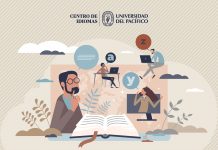All along teaching, different teaching approaches have been applied in education in order to attend learners with the latest in methodology and to provide a more personalized teaching. On the other hand, teachers have adapted their teaching style to the needs of students; that is from Grammar Translation, Direct Method, Situational Approach, Audio-lingual, the Communicative Language Teaching, TBL, and others, the challenge has still been to develop sessions that are more communicative so that learners achieve the mastery of the Common Core standards.
Increasingly, the challenge leads teachers to incorporate activities that help learners develop not only the four language skills: listening, reading, speaking, and writing, but also integrate rigorous core academic content with critical thinking and complex problem solving skills, as well as to promote collaborative work so they communicate effectively. However, the educational policies in our country force teachers to cover a syllabus a fact that unfortunately restricts not only teachers but also students´ creativity and this entire dream remain there.
If we only reviewed of our ‘lectures’ given in class at the end of every year, we would probably notice that some of them were worthless. Tons of worksheets, handouts, quizzes, and exams wouldn’t have been necessary for sure, but they had to be applied because of the syllabus and the evaluation system. So are we on the right track to be ready to teach next generation learners? Isn´t it time to stop and think about our job and the way things are being done in the classroom?
I think we should take some time and reflect on how to redesign lessons and the way learners need to be attended. Are we speaking their language, or we keep teaching the same way to every single group thinking we have the panacea and will make things work in class. We need to make them more personalized and competency-based. A good start is recognizing that Baby Boomers, X and Y Generations have received significantly different education –numberless methodological approaches- and that the current generation as well as the coming one need urgent changes in class. The past is gone; the present is the chance to make things work for them. Should you then be part of this change?
As teachers, we have the responsibility to promote curiosity, investigation, creativity, and much more through different contexts, which should be our main concern. Let’s get ready to do our best in enlightening next generation students. Cutting edge educational studies show that despite the wide variety of individual school models, next generation education will inevitably rest on three building blocks: 1) knowing the student 2) appropriate content, and 3) a variety of delivery methods. In combination, these components can potentially bring high levels of personalization to student learning.
Additionally, technology has transformed the way students interact and learn, both inside and outside of the classroom so teachers need to be familiarized to this kind of learning environments to fluently interact with them. With the rise of mobility nowadays, anywhere in the world, learners demand collaborative, active learning spaces as a baseline for entering a competitive workforce. Thus, in developing tomorrow’s leaders, thinkers, and creators, we must now put the right learning environment and course redesign to the top of the academic priorities in education. Apprentices will then be evaluating what worked well or not in all stages of their performance to make the necessary changes for the next learning experience.
What changes have been made in your school environment? Have you ever had the opportunity to work collaboratively with your colleagues and start focusing your teaching on next generation education?
Share your thoughts with us and leave your comments below.
References:
British Council (2015). Inglés en el Perú. Un análisis de la política, las percepciones y los factores de influencia. Retrieved from: http://www2.congreso.gob.pe/sicr/cendocbib/con4_uibd.nsf/318A8FA6AC9F382105257F3E00611BB9/$FILE/Ingl%C3%A9s_en_el_Per%C3%BA.pdf
Schleicher, A. (2014). Transforming Education for the Next Generation A Practical Guide to Learning and Teaching with Technology. Retrieved from:
Bio Data
Carmen Hurtado, graduated in the educational field; she holds a Bachelor’s degree in Educational. She finished her master’s studies in TEFL at Universidad de Piura, and taken some specializations in the EFL and Spanish. Currently teaching online courses and has been a lecturer in the late Annual Congresses at CIDUP. She works as a teacher trainer and as a Academic Coordinator at Universidad del Pacifico Language Center.
Estimated reading time: 3 minutes, 49 seconds










